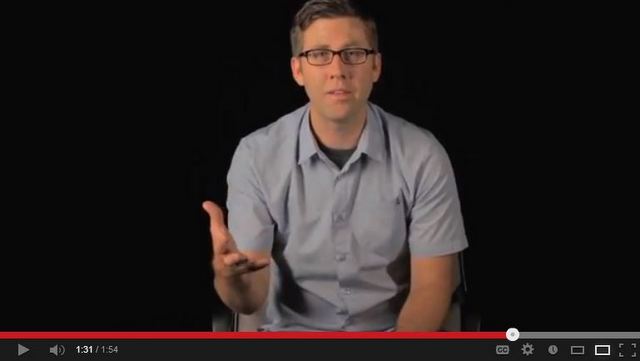It’s no secret that the Church has a hard time holding onto her youth! David Kinnaman of the Barna Group says that of Christians in the 18-25 age category 38% have significantly doubted their faith and 59% have dropped out!
Recently I was part of a discussion where the questions was asked
“How can we prevent our young people from losing the faith?”
Here was my response:
I would propose that the question asked makes an assumption that is not correct and that assumption is also one of the main reasons parents and churches struggle with this issue.
Asking “How can we prevent our young people from losing the faith?” assumes that our young people had faith from the beginning. This is a very dangerous assumption to make however, it is also very common among Christian parents. In my experience many churches have built their children’s programs around this false assumption. I believe we need to change the paradigm and instead ask “How can we reach our children effectively with the Gospel?”
The answer to this question may not be as easy as we think. Children who grow up in a Christian home and have always gone to church tend to know all the right phrases to say and behaviors to show, however, they may have completely missed the Gospel. We need to think deeply about how we are communicating the Gospel to them. The Gospel must be repeated on every level and in varied ways.
We should also not assume that a raised hand during VBS is always indicative of a true conversion. Further more I would advocate far more caution in the practice of baptizing young children, especially if those children have believing parents. Waiting until at least the teen years can help ensure that the child is acting on their own will and has a complete understanding of the Gospel.
It is also important that the church realize that most youth do not have believing parents and even if they do have believing parents it does not mean that they are receiving solid Biblical instruction at home. The church must assume that in most cases the only Biblical instruction a child will receive is when they are in Sunday school, Awana or other church ministries. This should in no way lessen the importance of the parents role but simply understand that most parents are not capable of effectively teaching God’s Word to their children.
Finally if the church wants to reach the children with the Gospel she must focus her attention on the parents and make sure there are effective ministries in place that teach parents how to raise their children in a Biblical way and how to communicate the Gospel to them.












Barb Raveling
May 28, 2013Wow, I love this post. I think for the most part, the church never had the youth in the first place. I would love to see churches really disciple the kids – not just do the fun social thing with the shallow Bible studies and discussions, but real discipleship.
It seems too often the focus is on getting them to accept Christ and then immediately jump to sharing their faith. Because the kids haven’t developed a relationship with God yet where they love Him so much He naturally spills out of their lives, they don’t want to witness, and feel guilty for not doing it. So right from the get-go, they feel like failures as Christians.
I think the church would be better off teaching them to love the Word, showing them how to overcome their weaknesses and sins – behavioral sins as well as heart sins. In other words – experiencing a life-changing relationship with God before they ever leave home.
Often the youth leaders themselves don’t have that type of relationship with God, so it’s hard to share what they don’t have themselves.
Rick Burke
May 28, 2013Obviously we know for kids to truly have saving knowledge of Christ, it is a matter of the heart. A big part of the problem is that they aren’t being taught that God invented science! Miraculous stories in the bible seem like fantasy, like Harry Potter, when compared to millions of years of evolution taught by “intellectuals”. In reality the evidence points directly to the bibles explanation of creation as the most logical and best reasonable answer! Once people (kids and adults) understand that the account of creation in Genesis is 100% accurate, literal, and the very basis of the truth, then we can better get to the matter of the heart! They need something solid to be able to get past the confusion. If you say it, it may or may not be true…if they come to the conclusion that they can trust the bible themselves…now their faith is their own!
Caleb
May 28, 2013Rick, you’re right that evidence does point directly to the Biblical account of creation. I think that teaching the youth science from a Biblical perspective can be helpful especially if they are in public schools where they are getting a strong evolution/atheist influence.
Caleb
May 28, 2013I like the way you said “I would love to see churches really disciple the kids – not just do the fun social thing”. I think you’re dead on.
Caleb
June 1, 2013Barb, sadly youth programs often lack some of those vital teachings that you mentioned. Discipleship is another huge issued that needs to be tackled in our churches. Especially when it comes to youth often the focus is on making things fun and attractive rather that actually deepening their faith and helping them learn to live godly lives.
Melanie Wilson
May 30, 2013I really agree about the importance of witnessing to our children. Sadly, I think even teens will claim to have faith to please their parents–and not always deceitfully. I think many people don’t really understand what faith in Christ because they haven’t experienced it. The kids and I have read many biographies of great missionaries who were raised in Christian homes and weren’t believers until adulthood. That, at least, gives me hope!
Caleb
June 1, 2013Melanie both my older brother and sister were baptised in our church as children then about 15 years later they decided to get baptised again because they felt that they didn’t really understand salvation at the time when they were first baptised. It’s hard because parents want their children to believe so badly, however we need to make sure that they both understand and that their belief is personal and not just a response to their parents desires.
I think that’s great that you are reading missionary biographies with the kids. What biographies have you read?
Sue
June 1, 2013You must be a carpenter because you have hit the nail on the head! Great post.
Caleb
June 1, 2013Thanks Sue! I do have some carpentry skills but it’s not my main strength. Blessings to you!
Josh Walker
June 5, 2013Great post! I think you are spot on with your analysis. I think we can take that a step further and realize many of the adults in the church are only active christians for two hours on Sunday. They have no prayer life or true devotion to Christ. Their salvation is not for me to decide but I do know that many do not bear any fruit. Many of these adults are the examples for the youth.
I think followers of Christ and the Church should take more time to disciple those that are already “professing” believers. Could you image if everyone that sits in a church on Sunday became “doers of the Word and not hearers only”?
Caleb
June 5, 2013Josh, that would make a very powerful church if everyone started actively discipling. Unfortunately many feel that is the job of the pastor. What can we do to change that view in our churches?
Barb
June 5, 2013I was thinking the same thing, Josh, but I didn’t know how to say it in a gracious way. You accomplished that. Caleb, you asked, how can we change the view that it’s the job of the pastor?
I was a bored and fruitless Christian for many years. WHen I finally started growing closer to God and working on my own sin and really getting into the Word – it took me about three years of time just growing in my relationship with Him (I wasn’t discipled by anyone) before I even had the impulse to disciple others.
I’m glad I waited that long because then it was desire and relationship driven rather than guilt or program driven.
So I think the answer is to help people become disciples first, and then they’ll actually want to disciple – when we put the pressure on the kids to get out there and start witnessing right away, we’re essentially helping them start out their walk with God feeling guilty because they’re not measuring up.
Plus I think it would help to change the view of discipleship. it’s not just filling kids up with knowledge, but helping them learn how to break free from their sin and grow in godly character. I’m rambling!
Josh Walker
June 6, 2013First, let me say that I dont always bear fruit or live out my faith the way I or the Lord would like. I didnt want to come across as someone that thinks they have it all figured out, I fail miserably daily. Fortunately for us our debts have been paid.
I think the first critical area that needs attention is the absolute lack of Bible knoweveledge of church goers. I sincerely believe that most only open their bibles on Sunday. Obviously you don’t have to be a Bible theologian in order to be saved but the Bible gives us 1) God’s revealed will 2) shows God’s love 3) a way of connecting with God 4) the history God’s people 5) shows us why we need a savior 6) shows who that Savior is 7) shows what God commands of us 8) a manual for discernment in all areas 9) points to Jesus at every turn 10) God reveals himself to you in a personal way through his word. I could go on and on but you get the point. I think if people became intimate with the Bible they would truly understand the gift they have been given. Not to mention the great peace and assurance one sees in the perfection of the Bible.
Another critical area is accountability. We ask the pastors and leaders to be accountable (in most cases). However, God has given everyone in the church gifts to edify and progress the church and fellow believers. Instead we go the other way and don’t want anyone involved in our lives or conversely be involved in anyone elses lives.
The question is how can you begin to accomplish these things without seeming to be even more exclusive and legalistic? I mean who wants some old man that sits in front of you on Sunday to know that you struggle with pornography or that you need help getting your child school supplies. Who wants to go somewhere where they “make” you read the Bible.
I don’t have the answers. I have ideas but when I examine them I realize they are only band-aids.
Therfore, I continue to pray for God to turn hearts and minds, and that I would personally be bold and courageous in every opportunity the Lord provides.
Barb
June 7, 2013I didn’t think you came across as someone who has it all figured it out. And I agree that the Bible is all important. Sometimes I see it taught just as a basis for theology though and not as an ongoing essential life support system – it’s possible that if if it were presented that way, the kids would have more of a reason to delve into it. And I agree, the more intimate they become with it, the more they will value it.
Just as an example, so many of the Bible verses they are required to memorize are theology verses – what if they were given the opportunity to choose verses that would help them break free from their sin? THey could see the power in those verses as they used them to say no to temptation. Jesus used Scripture in his battle with Satan – I’d love to see the kids equipped that way.
And of course, I’m not saying they don’t also need the theology. The Bible is profitable in so many different ways.
Caleb
June 7, 2013Barb, certainly there are problems in how we teach the Bible to our children. Maybe that is because we don’t know it that well ourselves. On thing we are doing here that seems to be very helpful is teaching chronologically through the entire Bible. We found than many Christians don’t understand the Bible as a whole. They know a few verses here and there but do not grasp the overarching storylines. If the adults don’t understand this how can we expect the children to?
We choose 20 stories from the OT and 20 from the NT that help bring out the main themes of the Bible and teach the vital issues. We’ve been teaching this way in churches now for about three years and especially among the youth it has been received very well.
Barb Raveling
June 7, 2013That sounds like a great idea. Our church has been pursuing the Read through the Bible in a Year (or three months) program. We’ve had a good percentage commit to it. I’ve been doing it since the 1st of the year and am really enjoying it. I usually spend lots of time on smaller portions of Scripture in my quiet times, but I’m really loving the quantity and the overall picture it gives me to read through all of it so fast (at least it’s fast for me – I’m doing the year long program).
Josh Walker
June 8, 2013Barb you are very right about the theology. I go to a christian university for theology and educational ministries and I constantly have to ground myself and realize that theology is great but I tend to compromise or neglect my personal relationship with Christ. I heard Francis Chan say that once he got out of seminary it took him a while to stop talking like a theology student. We don’t want to put theology in the place of Jesus.
Caleb
June 8, 2013Josh, you’re so right! I spent about 10 years in Bible college and seminary combined! Theology is vitally important but it is not God, it just teaches us about God. I have seen way too many theology students make their theology into their own god. Unfortunately sometimes we can do that with our children and they come to believe that if they know enough about the Bible and theology then they must be saved.
Josh Walker
June 9, 2013Amen. With our youth and new believers we need to feed them the gospel and Christ crucifed. I am a big doctrine and theology guy but those things must be viewed with both hands firmly gripped to the cross.
Caleb
June 9, 2013That’s a good way to put it Josh, “both hands firmly gripped to the cross”. Thanks for commenting!
Justin Bachtell (@jbachtell6)
July 3, 2013As an eighteen year old, this problem is especially relevant to me. Not only are the people around me giving up their faith, they are dragging along others as they go.
It’s getting more and more hard to find people with strong Christian values. Youth and young adults my age are unwilling to suffer for Christ’s sake, they are unwilling to give up their lives and take up the cross, and finally, they are unwilling to believe in a God who doesn’t provide them with instant gratification; their faith is based off of a materialism and prosperity gospel.
What you all have been saying is very true. I’ve grown up in a very strong biblically based home. My parents have provided and have cared for me as best they can with the strength God gives them. However, my faith was their faith for the majority of my life. I knew the right words and I knew how to act… But our faith isn’t carried out through works as I hadn’t fully grasped.
The day my grandfather died I was at the lowest point in my life. I turned to many things but nothing could pick me up. Finally, I felt the warmth of a Father with open and welcoming arms. I gave my grandfathers eulogy, and since that day I have felt the calling to pursue pastoral ministry.
What my generation needs is a renewal – a transformation. This of course is only possible through the Holy Spirit.
I agree with you Josh, we can’t just push my generation out their and expect them to be disciples. For a lot of Christians, especially young ones, being ridiculed at school all day has given them a very shy personality. I was the same way until the Holy Spirit moved in me. If someone were to tell me to go out and just start witnessing, I would be very turned off by that.
What I think is especially important now a days is to reinforce that Jesus came not for the righteous, but for the lost (Luke 5:32). Many young people my age feel that they can’t be redeemed or forgiven from their transgressions.
Apologetic study was also an invaluable resource to me in my life. Teenagers and young adults love to learn about the mechanisms, the glue, the mind to everything in life. I have always believed in the infallibility of divine revelation of God through his word given to us, but apologetics fortified that to an unbreakable faith.
There’s plenty of things though that we can do for my generation. I would be happy to discuss more with anyone that wishes. As I too am seeking tools to aid in discipleship. But I realize fully, I am merely the messenger, it is the Holy Spirit, our Savior, that moves in the hearts of those who are exposed to his grace and love.
I will be attending Trinity International University this fall working towards my mDiv in the pre-seminary honors program. I would love to chat with anyone, and am happy to receive any criticism and or advice.
Caleb
July 3, 2013Justin great points, especially about how Jesus came for the lost and not the righteous. I think growing up in a Christian family sometimes kids can feel like they were never lost. If they were never lost then how can they be saved? Thanks for stopping by and sharing your thoughts. I’m glad that you will be attending Trinity and pray for the Lord’s direction in your life! Have you ever considered missions?
Justin Bachtell (@jbachtell6)
July 3, 2013Well I’ve never really had an opportunity for missions abroad. But I have done some work with the Billy Graham Evangelical Association.
My youth group is partnering up with Grain of Hope to raise money to build a church and dig a well in Burkina Fasa, Africa. It’s a Muslim populated country, but the leader there is more than willing to let us Christians plant a church and provide water for the community. It’s a great opportunity to share with the people there the message of Living Water.
Caleb
July 4, 2013Justin, sounds like a good project that your youth group is raising funds for. We need more young people who are commited to following Jesus no matter where in the world he might send them.
Caleb
September 3, 2013You’re right Rob is it really is both. Thanks for stopping by and sharing your thoughts.
Kevin
February 19, 2014Good article, but I suspect that it should go further. How can we reach churches run like little more than businesses with the gospel these days? How genuine are adults and parents who profess conversion? Is faith something for the kids and not so much as for grownups – are the youth simply reflecting this sort of double standard? And so forth. Young people are a lot more perceptive than most realize (or want them to be).
Caleb
March 31, 2014I agree, Kevin there is much more that could and should be said on this topic, I probably should write another post addressing some of those issues. Thanks for sharing.